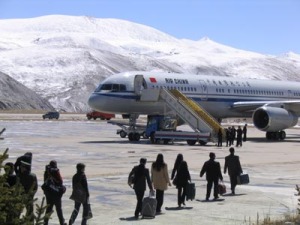Recently I’ve been doing a bit of work on the HolidayExtras Twitter account. We’re trying to use it as a way to promote products and special offers and generally spread the word about the brand and the company. It’s been fairly successful so far, we’ve gained 261 followers over a month or two and that’s with really very little work. It’s something that two of us work on in spare time between other projects.
I’ve been using Twitter for my own purposes as well outside of work, my Jon Clarke account for friends and then another for my band SecondEdge. It’s a really interesting tool for discovering new content on the web and seems a great way to connect with people. I never really got into Facebook, it was too much spam for me to really be bothered with. Twitter has forced people to really condense their message into what they want to say, which I think is a good thing. Enables me to cut out the useless fluff (pokes and pie throwing anyone?) and get to the good information.
Twitter search I think is big news for the Internet. It’s essentially a canvas of current public opinion. I’m using it at work to find what people are saying about the company and if anyone is having any problem with parking or hotels. It’s at this point that we can step in and offer a helping hand. It can be an invaluable boost to public opinion of your brand, even if you don’t make a direct sale the fact that you’re seen to be going out of your way to help can give a positive boost to your image. As soon as my band finish our recording I’ll be taking what I’ve learnt and applying it there as well.
So what does this have to do with travel, the whole point of this blog? Well what better medium to ask people about a hotel before you book a stay? What better way to find people who have been to your resort of choice beforehand? If you think about it, you can even ask locals where the best places to eat are before you get there.
I’ll try to paint a scenario for you. I’m planning a holiday for the summer, let’s say to New Zealand. I’m planning on staying at a Gatwick hotel before I fly out. I can search Twitter for Gatwick hotels and see what people have to say. Like this;
It's easy to get public opinion
So what I could do is directly message this person and ask what hotel they stayed at and what they thought of it.
Let’s say I booked my hotel, I’ve flown over to New Zealand and I’m looking for a good place to eat in Wellington. Well, what do I find on Twitter?
So where are the best restaurants in Wellington, New Zealand?
As more and more people sign up (hopefully it’ll be bigger than Facebook) it’ll become easier and easier to ask almost anything you like and get genuine help and opinion.
However you still have to be careful, and just like the rest of the Internet there’s a lot of crap out there. Make sure you can wade through the rubbish and find the trustworthy stuff. Right now the majority of the Twitter population is made up of early adopters and tech-savvy people. As it becomes more mainstream then it’ll inevitably attract the whole plethora of people we’ve (sadly) come to expect online. That being said, I’ll still be using Twitter search and I’d encourage you to as well.
As a final point I’d like to consider the possibility that Twitter and the services that will inevitably outdo and supercede it have brought in Web 3.0, or the Semantic Web. The Wikipedia article defines the Semantic Web as;
The Semantic Web is an evolving extension of the World Wide Web in which the semantics of information and services on the web is defined, making it possible for the web to understand and satisfy the requests of people and machines to use the web content. It derives from World Wide Web Consortium director Sir Tim Burners-Lee’s vision of the Web as a universal medium for data, information, and knowledge exchange.
And this is exactly what you can do with Twitter. You can ask an open question and hope that your followers will answer. Or you can find an “expert” through Twitter search and then ask them. Now the problem with it as that you’re reliant on other people responding and that they’re reliable. And what if you don’t have enough followers? What the real Semantic Web will be is an automatic process that will work much like Google’s current search engine but will understand language and your questions. I think that Twitter is a step in this direction and that anyone going on holiday would be foolish to ignore its potential.
The message I’m trying to get across here is that even if you don’t really care for the Internet Web 3.0 theory stuff is that it’s never been easier to ask about where you’re going on holiday and get genuine recommendations. The strongest referral one can get is from a friend that has already experienced what you’re thinking about doing. The difference here is that you can have friends from all over the world, and that’s just never been possible before.




